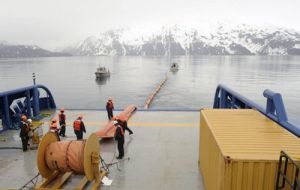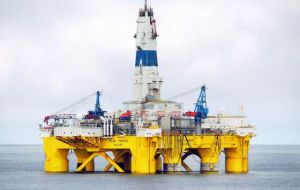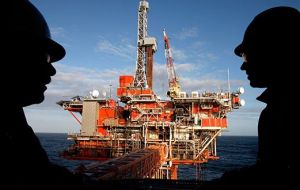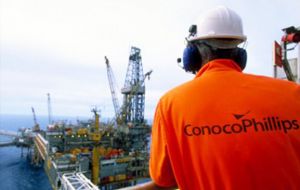MercoPress. South Atlantic News Agency
Oil megaprojects won't stay on the shelf for long
 Oil majors are scrambling to cut costs, and large-scale projects with high costs and long time-horizons are not making the cut.
Oil majors are scrambling to cut costs, and large-scale projects with high costs and long time-horizons are not making the cut.  Spending on deepwater exploration is expected to be cut 20/25% industry-wide, according to Barclays, higher than the 3 to 8% cut for exploration on all fields.
Spending on deepwater exploration is expected to be cut 20/25% industry-wide, according to Barclays, higher than the 3 to 8% cut for exploration on all fields.  Around 80% of large projects fail to stay on budget and come online at the expected start date, according to Bloomberg.
Around 80% of large projects fail to stay on budget and come online at the expected start date, according to Bloomberg.  Royal Dutch Shell recently scrapped its Arctic program and wrote off a costly oil sands asset at Carmon Creek.
Royal Dutch Shell recently scrapped its Arctic program and wrote off a costly oil sands asset at Carmon Creek.  The completion of Chevron's Big Foot project in the Gulf of Mexico will be pushed back by a few years because of equipment problems.
The completion of Chevron's Big Foot project in the Gulf of Mexico will be pushed back by a few years because of equipment problems.  ConocoPhillips announced it was backing out of deepwater altogether. By 2017, it will cease deepwater exploration and will sell off its offshore leases
ConocoPhillips announced it was backing out of deepwater altogether. By 2017, it will cease deepwater exploration and will sell off its offshore leases One casualty of the oil price downturn could be the megaproject. For years, as conventional oil reserves depleted and became increasingly hard to find, oil companies ventured into far-flung locales to find new sources of production.
Extracting oil from these frontier areas required more advanced technology and a lot more capital: Ultra deepwater, Arctic offshore, heavy oil sands, and increasingly, the Lower Tertiary.
Often these megaprojects projects were only the purview of the largest oil companies, as smaller players did not have the resources – financial or technological – to make them work. Meanwhile, smaller drillers, at least in North America, turned to shale, which required less upfront cash and could be turned around on a quick timetable.
The collapse of oil prices, however, could kill off the megaproject. The oil majors are scrambling to cut costs, and large-scale projects with high costs and long time-horizons are not making the cut. A combined $19bn in write-downs was recorded in the last week of October as the oil industry reported third quarter earnings.
Spending on deepwater exploration is expected to be cut 20 to 25% industry-wide, according to Barclays, substantially higher than the 3 to 8 percent cut for exploration on all varieties of fields.
One problem for these large projects is chronic delays and ballooning costs. Around 80% of large projects fail to stay on budget and come online at the expected start date, according to Bloomberg. About three-quarters of them have suffered delays, and two-thirds have blown through their original cost expectations.
That could force even the oil majors to start to back away from large-scale oil projects. Royal Dutch Shell recently scrapped its Arctic program and wrote off a costly oil sands asset at Carmon Creek. The completion of Chevron's Big Foot project in the Gulf of Mexico will be pushed back by a few years because of equipment problems.
In a glaring example of shifting priorities, ConocoPhillips announced that it was backing out of deepwater altogether. By 2017, the company says it will cease deepwater exploration and will sell off its offshore leases that it does not plan on developing. Conoco has the rights to 2.2 million acres of Gulf of Mexico territory, and it could still develop some fields, but it will stop searching for new discoveries.
The decision will save $800 million in exploration costs, money that will be redirected to exploration in other areas. “We are exercising flexibility in our capital program, dramatically lowering our cost structure and divesting assets that do not compete for funding in our portfolio,” ConocoPhillips CEO Ryan Lance said in a statement.
With the largest oil companies starting to back away from the megaproject, the result could mean a greater focus on shale. Production from an average shale well is a fraction of a deepwater well, for example, and output also suffers from dramatically steeper decline rates compared to offshore. However, drilling a shale well can cost a few orders of magnitude less than a large-scale offshore project. That is a feature that is hard to overemphasize in today's oil pricing environment.
The narrower focus on smaller projects, especially shale, could mean the end of the megaproject. The collapse in prices may mean we don't see more white elephants like the Kashagan project in Kazakhstan, an offshore boondoggle that has required more than a decade of development, tens of billions of dollars, and still won't come online for a few more years. Or, LNG export facilities like the massive Gorgon LNG, led by Chevron, which saw costs balloon to more than $54 billion, could be the last of its kind.
Then again, there is a question about whether or not shale can really be a major source of supply over the long-term. The International Energy Agency sees North American shale peaking towards the early part of the 2020s and declining thereafter, all but making it a blip on the radar when looking at oil production from a long-term standpoint. By the 2020s, the IEA says, the world will once again be dependent on traditional sources of supply – largely from the Middle East.
But for new sources of supply that are not state-owned, the industry may have to shift back to the mega deepwater projects that they are beginning to shun today.
By Nick Cunningham of Oilprice.com




Top Comments
Disclaimer & comment rules-

-

Read all commentsIn various areas of human activity Brazil is a leading developer of new technologies and the consequent creation of value.
Nov 10th, 2015 - 11:04 am 0In the field of oil exploration in deep waters Brazil is the only country that has technology and extraction costs $ 9 a barrel.
In the medical field we are the holders of drug patents to completely cure AIDS and cancer.
http://g1.globo.com/ciencia-e-saude/noticia/2015/09/pilula-da-usp-contra-cancer-nao-passou-por-testes-clinicos-entenda.html
@Brasso
Nov 10th, 2015 - 04:01 pm 0And how many tens of billions of US $ were “overpaid” in the process, eh?
Probably enough to pay off most of the third worlds debt, certainly all of Brazil’s.
Commenting for this story is now closed.
If you have a Facebook account, become a fan and comment on our Facebook Page!